Playing with Words and Music: An Interview with Victor Wooten (Part 3)
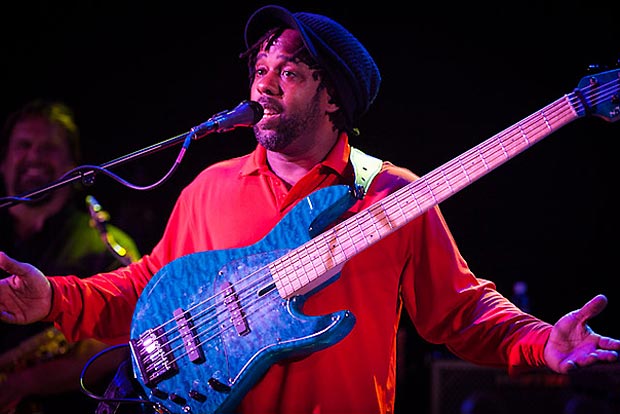
Victor Wooten has been touring since he was five years old, most notably in his early years as a member of the Wooten Brothers Band. He and his brothers traveled with a variety of opening acts – including Curtis Mayfield in 1969 — and during the seventies and eighties shared the stage with artists like Stephanie Mills, War, Ramsey Lewis, Frankie Beverly and Maze, Dexter Wansel, and the Temptations. His touring in the early nineties with a certain banjo player we all know and love – Bela Fleck – set him on a path to begin his career as a solo artist. Following the release of his sophomore solo album, What Did He Say?, Victor and J.D. Blair hit the road as the dynamic bass/drum duo. Victor recalls that their first gig, for which they had traveled twenty hours, earned them $25 each.
Much has changed since then, and with each subsequent tour Victor has increased his fans’ appreciation for his musicality and creativity. From the Soul Circus tour (which showcased his skills as a magician) to the Live in America concerts (which seemed to take funk to a whole new level) Wooten’s shows have continued to amaze and surprise his audiences. And, like we mentioned in the first segment of these interviews, he never seems to do anything the same way twice. The 2012-13 Sword and Stone/Words and Tones Tour continues that tradition by offering concertgoers a musical experience that will surely leave them awed and inspired.
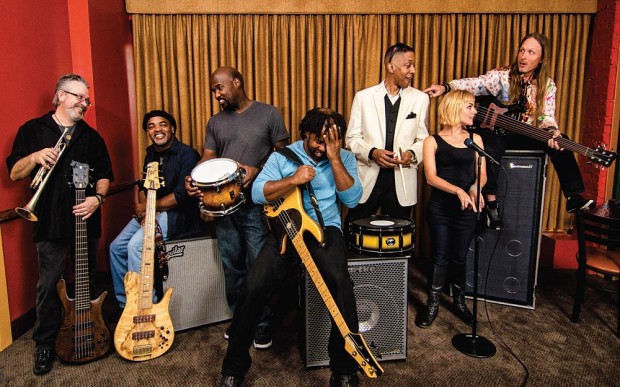
On this tour, Victor shares the stage with a host of accomplished musicians: renowned fretless master (and now Chair of Bass at Berklee College of Music) Steve Bailey, longtime friend and fellow bass teacher, Anthony Wellington, former road manager and New York bassist, Dave Welsch, the “Groove Regulator,“ J.D. Blair, Wooten Band drummer Derico Watson, and new Wooten Band vocalist, Krystal Peterson. As you might notice, many of these players have long known and played with Victor in a variety of settings, but this tour brings them all on the same stage at once. If you think that means a lot of bass will be played, you’re right. If you think it will sound like a lot of bass being played, you’re in for a surprise. With this tour, Victor again proves that he is a bass player first and foremost committed to music. As such, he sees an ensemble of low-end instruments equal to the task of sharing any given musical message, and he does so brilliantly with the aid of his fellow musicians. If you find the tour coming anywhere near your hometown, check it out. More than likely, you will leave never looking at your bass (or yourself) in the same way.
Most noticeably, the tour features four bass players, two drummers, and a singer. How did you come up with that idea?
The first thing I would say is that I look at it as a tour that features seven musicians, where four of us primarily use bass as our main instrument. Everyone in the band plays more than one instrument, including Krystal. During the show, she’ll hop on the drums or the keyboards. She also plays flute. A tour with four bass players would be hard for even me to get my head around, but I see it as a tour of musicians who play various instruments.
The idea for the tour came about at one of our camps when Dave Welsch put down his bass and picked up a trumpet. I had no idea he could play it. Then I heard that Steve Bailey used to play trombone, and I knew Anthony Wellington played keys and guitar in addition to bass. All that got me to thinking that it would be cool if we could put something like this together for people to see.
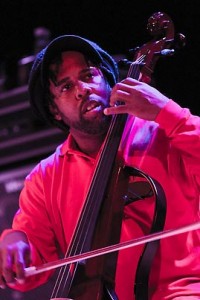
On the tour, everyone plays multiple instruments, including you on the cello. How does it feel to pick up an instrument that you played mainly during your middle school and high school years?
It feels great! It has taken a little effort to get comfortable on it, although I’m most comfortable when I’m surrounded by the band. In rehearsal, surrounded by great musicians, my cello playing instantly gets better because I’m feeling the music more than I’m feeling my mistakes. That’s a beautiful thing. When I recorded the album, it was just me in the studio so I was comfortable there too. There was no pressure, nobody listening, and I had the benefit of Pro Tools, which allowed me to fix anything by punching in. To play live, though, I had to work harder at being able to play everything correctly, but learning while rehearsing with the band helped with that a lot.
Rumor has it that in addition to playing the cello on this tour, you’re also playing a beat-up, old euphonium. Any truth to that?
Yeah, but not yet. I’m planning on bringing that out on stage soon. I’ve learned that when we musicians get on an instrument that we’ve never played, something happens mentally. We just let go. We tell ourselves, “I don’t have to prove I’m good at this—because I know I’m not,” and all of sudden a smile comes over our face as we let go and become like a kid again. That’s how it is on this tour. People keep telling us that it looks like we are all having a lot of fun. We are!
So, if you’ve never played the euphonium before, how are you going about learning to play it?
I’ve never played a wind instrument in my life, so my approach to learning the euphonium has been to have Steve and Dave teach me how to play at least three notes on it. If I can get three notes out of it, though, I know I can add the rest to make it sound good. I’m working on playing a simple little thing I can pull off and make feel good. So, I’ve been working at the exercises they’ve been giving me—playing long tones and paying attention to how the instrument works.
How does a band of that many low-end instruments keep from crowding the low-end spectrum?
It starts mentally first, with everyone be aware of what’s going on. That’s the first thing. Everyone has to understand that we have a lot of low-end up on the stage. You have to think not from an instrument perspective but rather from a musical perspective. Yeah, the instruments we’re all playing are low-end instruments, and that’s their traditional role, but you have think of it from a compositional standpoint. As a composer or orchestrator, I understand that there are more frequencies to be represented than just the low ones. I have to be aware of that, and the band has to be aware of that.
One of the first things I told the band was, “Whenever two or more bass players are playing, the person playing the main bass line needs to keep your bass fat. If you’re not playing the bass line, thin your sound out. Roll off the low-end.” Otherwise, we would just be piling low frequencies on top of each other. This way, the basses cut through at different frequencies.
That sounds like good advice for any bass player looking to play with another bassist.
Exactly. Anytime I play with another bassist, that’s my general rule.
In that same vein, is it at all difficult to negotiate two drummers playing at the same time?
Not with these two drummers [J.D. Blair and Derico Watson]. That’s not an issue at all. On many of my songs, more than one drummer is playing. For example, on “Left, Right, and Center,” from Palmystery, there are three drummers playing. We just decide who’s going to play what in advance and approach it musically. When you have such great musicians behind these instruments, anything is possible.
On the stage, the drummers are facing each other, looking right at each other, and they know exactly what’s going on. They’re so good, and they aren’t going to play anything that upsets the groove.
For the last couple of years, you have hosted “jam weekends” at your campground in Nashville. How does this tour reflect some of what you hope participants take away from that weekend experience?
That’s a really good question. I hope people can see us on stage and learn how to make jamming with other players work. When you’ve got four of us up there holding basses (and sometimes J.D. will even pick up a bass), you get a chance to see how you can make it work. Every night people are coming up to us and saying something about how amazed they are that we are making this work musically. It is carefully orchestrated. You’ll see sometimes that one or more of us will just stop playing during a song to make room for the music. I am hoping that those who want to learn how to jam like this will begin to see how to make it work, understanding that sometimes the best thing you can offer music is to lay out.
You began touring a bit with the music from these two albums this past spring. How has that affected the current tour?
For one, we’re better at it. We’re more comfortable with the music and can take more liberties with it now. Also, now that the records are out and people can get more familiar with the songs, we can add more new songs to the set list and offer different arrangements of these songs. Before, changing the arrangements of the songs didn’t really matter to the audience since they had never heard them before. Now we can mess with them and people can see how we are able to change things up.
Does the set list for the show change from night to night much??
Right now, not much. We pretty much work off the same template, but we do change things up here and there. We don’t have a set list on stage; we just work with this template. For example, some nights we have Dave sing his “Get It Right” song and other nights we play something else.
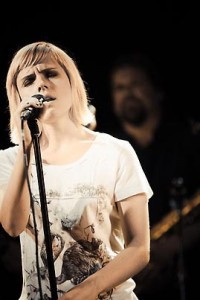
On the album, you feature a number of female vocalists, but your tour features just one of them, Krystal Peterson. Did you have to rearrange some of the music to accommodate her vocal style or range?
Going into rehearsal for this tour, I was aware of the fact that we might have to change keys on certain songs, or sometimes the melody line, to fit within her range. I was initially really concerned about that, but I didn’t mention it to Krystal. I was going to let her mention it to me if that became a problem. Fortunately, she is so amazing that we didn’t have to change a thing. Every song is in the same key as the record, although she puts her own flavor on the melodies, of course. It’s amazing.
What do you hope audiences take away from the current Victor Wooten Band tour?
I want their minds to be blown to some degree. I want them to see things they’ve never seen before—or even thought of. But, as with all my tours, I want people to leave inspired. I don’t want them to leave just thinking, “Those guys were great!” I want them to be inspired to do their own thing. Whether they’re a musician or not, I want them to leave inspired to live their passions to the fullest. Whatever makes them come alive, I want them to have the energy and desire to do it as they walk out that door. I want them to be fulfilled—musically, emotionally, and spiritually. I always want people to leave with questions. I want them to leave thinking about the experience and how it connects to their own lives.
The CDs have now been out for almost two weeks. In the first week, both were in the top ten on iTunes. How are you feeling about the albums now?
All artists want their albums to sell well, of course, but more than that I want people to enjoy the music. I want people to be happy with it. I was amazed at how well it did on the first day it came out, and I thank the fans for that. They’re stepping up to the plate, and I really appreciate it. To have two simultaneous releases in the top ten on the same day is cool. I think we are breaking some new ground with this album, and it’s because of the people buying the albums. It feels really good. I’ve done my part and the audience is doing theirs.
What does the success of this album mean to you in relationship to the fact that you released it on your own label?
Because I put these albums out on my own label, I am especially thankful. With indie labels, I think we have a chance to force record labels to start doing things right. The way for us to do that is by supporting independent labels through buying the music rather than illegally downloading it. Artists have been getting the short end of the stick for a long time and indie labels offer us a way to try and take care of ourselves. Fans would be horrified if they knew how record labels treat artists. Now we have a chance to celebrate good music by supporting indie labels. It’s already been happening, which is why you see the major record companies fading. There are a lot of artists out there, like me, trying to do it on their own, so I appreciate everyone supporting these records and the tour.
Be sure to check out all three parts of this interview series with Victor.
Concert photos by Joshua Elioseff and Dancer Productions

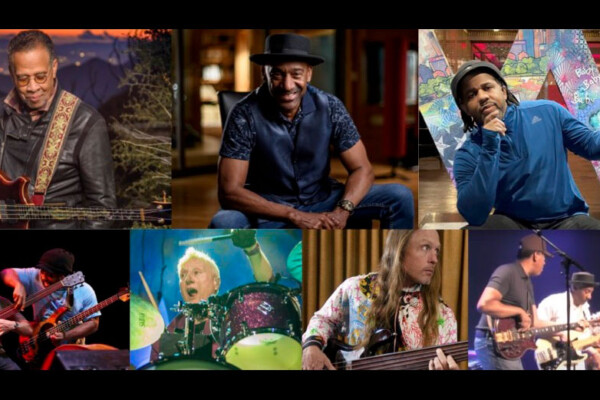
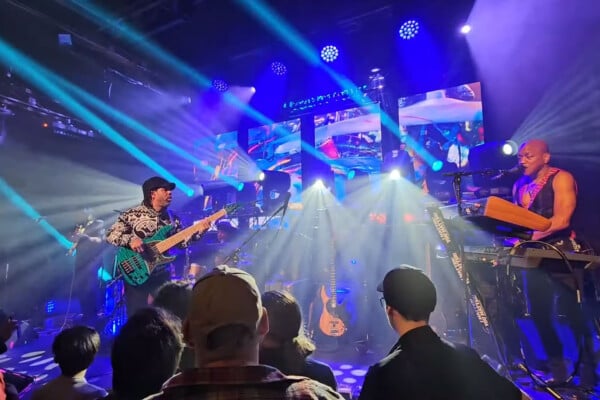
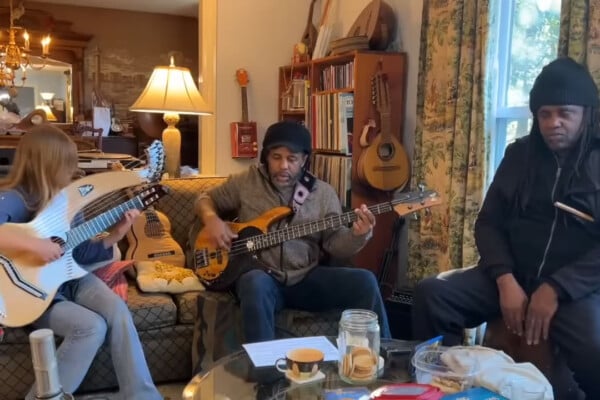
Thanks no treble, for this fantastic interview series. One of the best interviews I’ve read. Great questions and information about a great musician and his music. Very well done. You guys rock!
victor wonder is the master teacher is wonderful playing bass is the best bass player of all times is the most complete bass player may have and techniques are the best blessings.